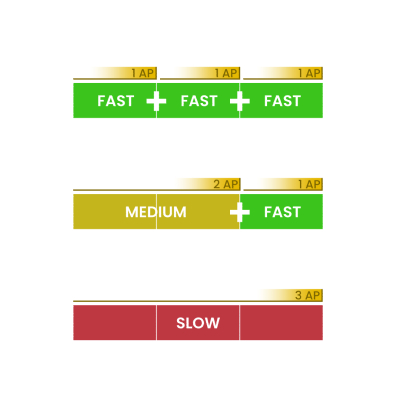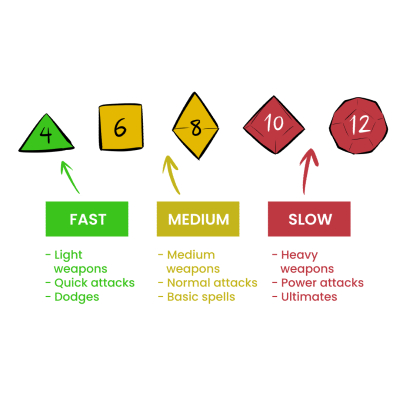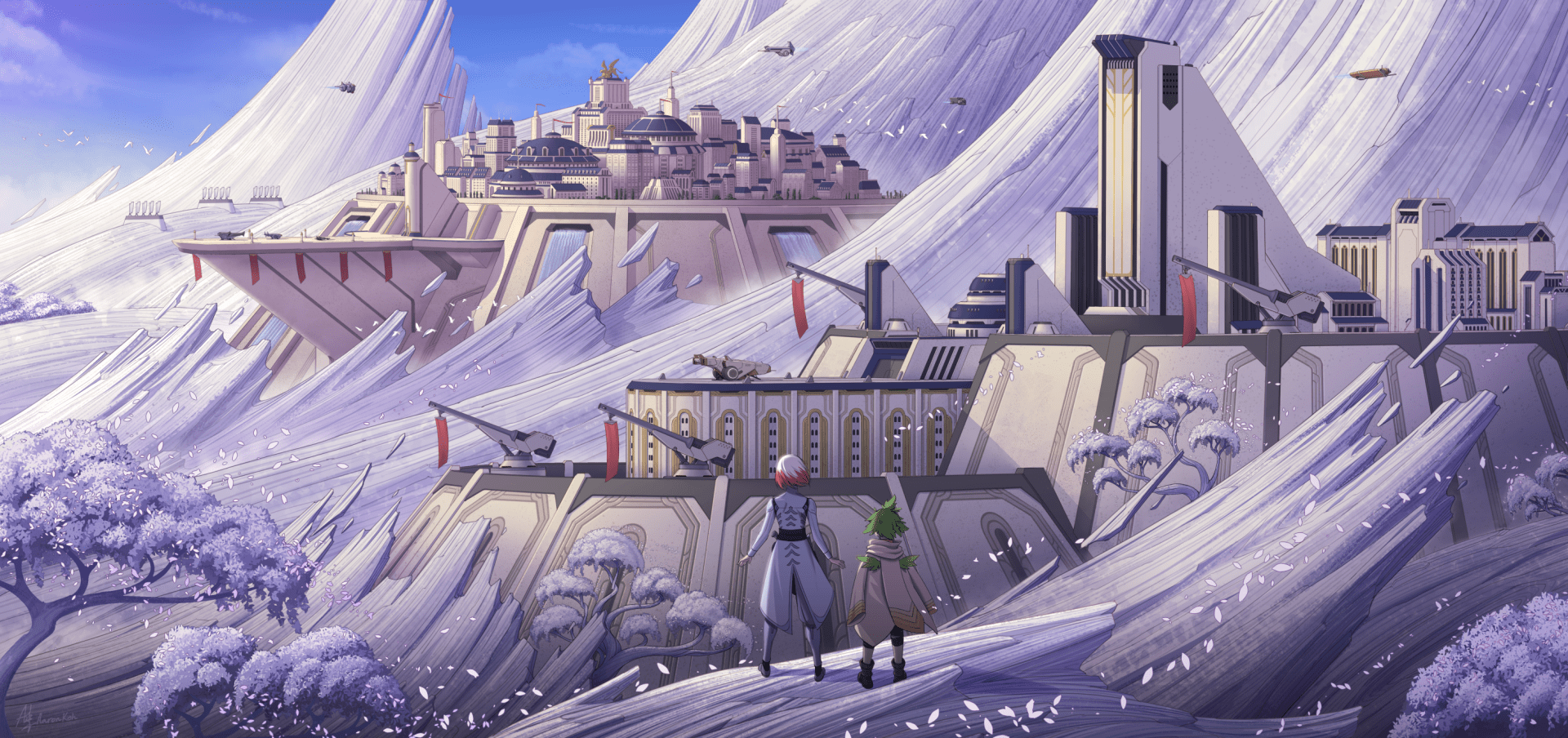Version 0.5 Dev Preview #5: Action Economy & GM-less Gacha? What?
In today's stream, I went through a lot of major ideas and changes for Version 0.5! Totally different from the last update post, even.
Action Economy 2, Economic Boogaloo
Well I've went and revised the action system again.
I've noticed with prior versions that while the tactical aspects were pretty smooth, the action system lacked the tools to allow the player to easily perform more complex and unusual actions during combat. If you wanted to, you could try and backflip over an enemy's head while performing a round slash... it'd just involve a good deal of finagling to do so. So I took to the drawing board in search of something more intuitive for abstract actions while still allowing for tactical crunch.


What I arrived at is Action Duration Dice - basically a hybrid of an action type system (e.g. 5E's Action + Bonus Action type system) and a more granular action point system (e.g. Pathfinder). You have 3 AP that can be done in a combination of Fast (1AP), Medium (2AP) and Slow (3AP) actions.
Instead of stepped dice values equating to stats (e.g. having a stat represented by a d6 or d8), which was what I previously did with the Action Loadout system, now the dice values are assigned to the duration of the action you declared: Fast uses d4, Medium uses d6-d8, and Slow uses d10-12.
So probably any conceivable action you could take, say a sword swing, can be performed as a Fast, Medium or Slow duration - from a short jab to a mighty charged swing - and you would roll a die that represents that duration. And of course, you can do this as a Reaction as well.
Revised Reactions
Reactions then had to be reworked to fit this new system; I also wanted to minimise too much disruption to the initiative order, where everybody uses up their turns or reactions until they lose track of who's going next.
The basics of it is: Any action can be reacted to, but only up to an amount equal to that action's duration. A Fast action can only be countered or reacted by a Fast action; a Medium action can be reacted by a Medium action or up to two Fast actions (either from the same person or two different entities). After that, no more reactions can be made in response to that action. Naturally, if you spend those Reactions, you would have less actions on your actual turn.
This means on paper, you could spend all 3 AP to just React and dodge whenever an enemy attacks you, but it'd be a pretty inefficient use of your turn, because you'd only really be spending d4s and not meaningfully affecting the fight. You'll have to take some hits to dish it out, and by attacking enemies, you can force them to spend an equivalent amount of AP to defend against you, leaving them with less actions on their turn.
By default, you would only roll 1 die to resolve any of these actions, rolling the die type based on the duration, but there are additional mechanics that let you roll more dice - but that's for another time.
A GM-less System?
I've recently looked into the possibility of making Voyager into a GM-less (or at least a GM-light) system. This was largely motivated by my own awareness that if I wanted to make a solid game, it needed to be something I was able to GM, and if the system could make me - someone who's far more player than GM - learn and run it well, then it would likely go even better for experienced GMs.
To that end, I looked into different GM-less games and solo RPGs, along with their underlying philosophies. A lot of them delegate the daunting tasks that scare players from becoming GMs - creating scenarios, guiding the player group and making NPCs and enemies - and distribute them among the players instead, which fascinate me.
This led me to the possible idea of the players creating and controlling multiple PCs.
Gacha? In MY RPGs?
It's no secret if you know me that I'm a fan of hero collector gacha games, like Arknights and Hoyoverse games. One thing I've always considered but didn't pursue for Voyager is the possibility of taking it into less of a traditional RPG (where you follow a single character for an entire campaign), and closer to what you might find in a gacha game's format (where you follow a wide cast of characters in a single world). It's only after recently exploring the GM-less route that I saw an opportunity to workshop this idea for Voyager: Tactics while it's still in its germinating stages.
The basic idea I want to experiment with is that each player makes 2-3 different PCs, based on very simple templates (I'm picturing that you would make them based on rolled tables and from mixing spells and abilities from several archetypal templates). After that, all the players shuffle these PCs together and at the start of each game session, they would field them into teams and take them on adventures together. In this sense, you as a player are not quite controlling a single person who is your facsimile into the world, but rather someone overseeing the activities and lives of a group you cultivate and lead.
Part of the appeal with gacha games is the sense of "emergent attachment". You are given a set of random characters, and through mixing and matching them together, you start forming attachments with all of them, since their particular team combinations are unique to your own play experience. This is not a purely gacha game thing either; it's found in the DNA of a lot of strategy/tactics games that let you recruit pregenerated characters, like Valkyria Chronicles, Fire Emblem and Etrian Odyssey, which falls very close to the type of game Voyager: Tactics tries to emulate.
In a sense, it can achieve all the high points of playing a hero collector gacha, but without the pains that come with them (the stamina gate limiting your playtime, random summons preventing you from getting who you want), and in fact allows you to make your own characters to fawn over and speculate team compositions for. It's definitely more on the gamist side, but that's something Voyager: Tactics has never really shied away from.
Of course, the tradeoff is that individual characters will need to have far less depth - at most having 2-3 main abilities and 1-2 passive skills, but this also meant that this detachment can lead to players being more open to make more novel PC ideas and experimental builds. And given how attached people are to characters in Arknights and Genshin: Impact, who ascribe so much depth and lore to their lives in spite of their relative mechanical simplicity, I think this is not a bad thing, and in fact can work really well if done right.
Is it right for Voyager: Tactics, specifically? That's what I aim to explore now, while it's still early enough to do so. I hope you continue to join me on this development journey - who knows if it might lead to something really cool?
Get VOYAGER | Version 0.831 Playtest
VOYAGER | Version 0.831 Playtest
Post-apocalypse hopepunk, science fantasy, badass anime girls.
| Status | In development |
| Category | Physical game |
| Author | Switchback Worlds |
| Tags | Anime, Dice, Exploration, Fantasy, Post-apocalyptic, Tabletop, Tactical RPG |
More posts
- Voyager Twitter account!84 days ago
- Version 0.831 Ability Card Tweaks91 days ago
- Version 0.831: Looking Better Than Ever!97 days ago
- 0.83 Quickfixes + Preset SheetsAug 28, 2025
- Voyager V0.83 Combat Update!Aug 16, 2025
- V0.8 UpdateMay 30, 2025
- Voyager: Tactics 0.7 - Combat Ready!Aug 30, 2024

Leave a comment
Log in with itch.io to leave a comment.